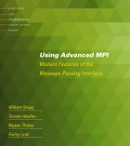Home
Publications
Awards
Research
NB Collectives
MPI Topologies
MPI Datatypes
Netgauge
LogGPS
OS Noise
eBB
Network Topologies
Ethernet BTL eth
ORCS
DFSSSP
Older Projects
cDAG
LogGOPSim
CoMPIler
Teaching
Miscellaneous
Full CV [pdf]
ew-hoefe
BLOG
bio


Events





Past Events






|
Netgauge - Operating System Noise Measurement
Netgauge OS Noise Measurement Description:
The noise pattern in Netgauge allows the precise measurement of OS
Noise. The current version supports three different benchmark methods:
- Fixed Work Quantum
- Fixed Time Quantum
- Selfish Detour
Netgauge (including all OS Noise benchmarks) can be downloaded on the
main Netgauge page.
|
|
General
The benchmarks use Netgauge's high-performance timers for different
architectures. Users should make sure that the configure script detected the
timer correctly and that it works reliably (no frequency scaling etc.).
Netgauge should be run on all cores (CPUs) of a processing system to ensure
realistic benchmarks. For example, if the machine has four cores and two sockets,
then Netgauge should be run with 8 processes on this machine.
General help: mpirun -n 1 ./netgauge -x noise --help
|
|
Selfish Detour (selfish)
This is the default benchmark. It is a modified version of the selfish
detour benchmark proposed in [5]. The benchmark runs in a tight loop and
measures the time for each iteration. If an iteration takes longer than the
minimum times a particular threshold, then the timestamp (detour) is recorded.
The benchmark runs until it recorded a predefined number of detours (it will
never halt on a noise-free BG/P system!).
Example run (on a very noisy laptop):
mpirun -n 2 ./netgauge -x noise
# Info: (0): Netgauge v2.2 MPI enabled (P=2) (./netgauge -x noise )
# initializing x86-64 timer (takes some seconds)
# Info: (0): writing data to ng.out
# Info: (0): performing Selfish benchmark
# min clock cycles per rank: 91 91
# Minimal cycle length [ns]: 42.055092
# Number of iterations (recorded+unrecorded): 606344901
# Threshold: [% minimal cycle length]: 900
# CPU overhead due to noise: 7.80%
# Measurement period: 41.26 s
The file "ng.out" contains the time of each detour. The
data can be plotted with the gnuplot command: plot "ng.out" .

|
|
Fixed Work Quantum (FWQ)
The fixed work quantum benchmark performs a fixed amount of work
multiple times and records the time it takes for each run.
Example run:
mpirun -n 2 ./netgauge -x noise -e fwq
# Info: (0): Netgauge v2.2 MPI enabled (P=2) (./netgauge -x noise -e
# fwq )
# initializing x86-64 timer (takes some seconds)
# Info: (0): writing data to ng.out
# Info: (0): performing Fixed Work Quantum benchmark
# random output (to prevent compiler optimizations): 1497980154
# random output (to prevent compiler optimizations): 1497980154
# random output (to prevent compiler optimizations): -931598522
# random output (to prevent compiler optimizations): -931598522
The file "ng.out" contains the detailed time of each work-quantum. The
data can be plotted with the gnuplot command: plot "ng.out" .

|
Fixed Time Quantum (FTQ)
Netgauge supports the Fixed Time Quantum (FTQ) Benchmark described in [2]:
A very small work quantum is performed until a fixed time quantum has exceeded,
for each iteration it is recorded how many workload iterations were carried out.
In the absence of noise this number should be equal for every sample. When there
is noise this number varies. Because the start and end time of every sample is
defined (because every sample takes an equal amount of time), periodicity in the
occurance of noise can be analyzed with this method.
The workload should be portable (written in C) and not modified by compiler
optimizations. For this purpose we use the workload described in [4]. A good
starting point for the length of the time quantum should be one millisecond as
suggested by [3].
Example run:
mpirun -n 2 ./netgauge -x noise -e ftq
# Info: (0): Netgauge v2.2 MPI enabled (P=2) (./netgauge -x noise -e ftq )
# initializing x86-64 timer (takes some seconds)
# Info: (0): writing data to ng.out
# Info: (0): performing Fixed Time Quantum benchmark
# random output (to prevent compiler optimizations): 1497980154
# random output (to prevent compiler optimizations): 1497980154
# random output (to prevent compiler optimizations): -931598522
# random output (to prevent compiler optimizations): -931598522
The file "ng.out" contains a detailed number of iterations for each time
slice. The data can be plotted with the gnuplot command: plot "ng.out" .

|
|
Acknowledgments
The noise pattern was funded by the FastOS II (LAB
07-23) project.
|
|
References
| HPCC'07 | [1] Torsten Hoefler, Torsten Mehlan, Andrew Lumsdaine and Wolfgang Rehm: | | | Netgauge: A Network Performance Measurement Framework Vol 4782, In Proceedings of High Performance Computing and Communications, HPCC'07, presented in Houston, USA, pages 659-671, Springer, ISBN: 978-3-540-75443-5, Sep. 2007,    |
| [2]
Matthew Sottile and Ronald Minnich:
| | |
Analysis of microbenchmarks for performance tuning of clusters
IEEE International Conference on Cluster Computing, 2004, pages 371-377, ISSN: 1552-5244, ISBN: 0-7803-8694-9
|
| [3]
Fabrizio Petrini, Darren J. Kerbyson, Scott Pakin:
| | |
The Case of the Missing Supercomputer Performance
SC '03: Proceedings of the 2003 ACM/IEEE conference on Supercomputing, ISBN 1-58113-695-1
|
| [4]
Carl Staelini and Larry McVoy
| | |
mhz: Anatomy of a micro-benchmark
USENIX Annual Technical Conference (NO 98), 1998
|
| [5]
P. Beckman, K. Iskra, K. Yoshii, S. Coghlan, and A. Nataraj
| | |
Benchmarking the Effects of Operating System Interference on Extreme-Scale Parallel Machines
Cluster Computing, vol. 11, no. 1, pp. 3-16, 2008.
|
|



























